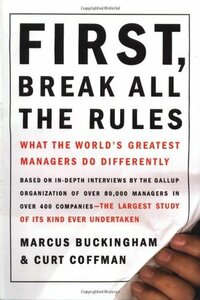Take a photo of a barcode or cover
94 reviews for:
First, Break All the Rules: What the World's Greatest Managers Do Differently
Curt Coffman, Marcus Buckingham
94 reviews for:
First, Break All the Rules: What the World's Greatest Managers Do Differently
Curt Coffman, Marcus Buckingham
challenging
informative
reflective
slow-paced
A slog to read; some fun anecdotes and many more boring ones. The book is decidedly written from a cishet male's perspective, and while I see where they aim to be inclusive in their target audience, nearly every reference they make to successful managers are other cishet (& mostly white) men.
informative
inspiring
slow-paced
inspiring
Management by focusing on peoples strengths and talents rather than trying to fix weaknesses.
It's more of a 4.5 than 5. This book wasn't one of my favs per se, but I did learn a lot from it and there were many truths that I took for granted that it proved wrong in business management. Later sets up a game plan for being an effective manager, something that I'm sure has been used thousands of time since the books conception and maybe one day will be used by me.
Second reading:
This was worth a second read years later. I remembered some of the general principles, but it was good to get a refresher on the details, especially the ordering of the top 5 questions.
First reading:
This book cleverly disguises itself as a book for managers, but it's so much more. I think every working adult should give this book a read. Managers may benefit the most from it, but it would also help employees figure out what's best for them and how to work with a seemingly difficult manager (towards the end of the book).
This was worth a second read years later. I remembered some of the general principles, but it was good to get a refresher on the details, especially the ordering of the top 5 questions.
First reading:
This book cleverly disguises itself as a book for managers, but it's so much more. I think every working adult should give this book a read. Managers may benefit the most from it, but it would also help employees figure out what's best for them and how to work with a seemingly difficult manager (towards the end of the book).
This book has good research-backed information for managers (and normal employees looking to understand more about managing employees). I feel inspired to re-take my StrengthsFinder assessment after reading this book.
If you are in a leadership position. I think you will enjoy the book. It will either give you validation for what you are doing currently or give you some helpful suggestions on how to do better. I like the title as I think that you can't get stuck into one particular style of management as things are changing all the time. What works today maybe totally obsolete tomorrow. The questionnaire for brand new and existing employees is something I have used with success.
I picked up this book because it was mentioned in some Forbes article I saw on things great managers do. On reading it, I saw that a lot of the stuff is things one would think are common sense. A lot of managers like to make like what they do is some mysterious, mystical thing or just something certain gifted people can do. It is not. It is dealing with people, and having the talent to deal with them well. So much of the advice in the book may seem common sense if you have such talent (or if you have been exposed to so many bad bosses and managers you just know they should be doing the stuff in the book instead). I did take a few notes, and I may write something a bit longer in my blog later. But in the end, the very simple gist of the book is this: hire the best people for their talent (not skills or knowledge. Those are important, but talent is the thing you need to look for since you can't teach talent), then do the best to make sure those folk can show you what they can do and let those talents flourish. Sure, set expectations and motivate, but if you select the wrong people, the rest will not fall into place. There is more, but there is the gist.




